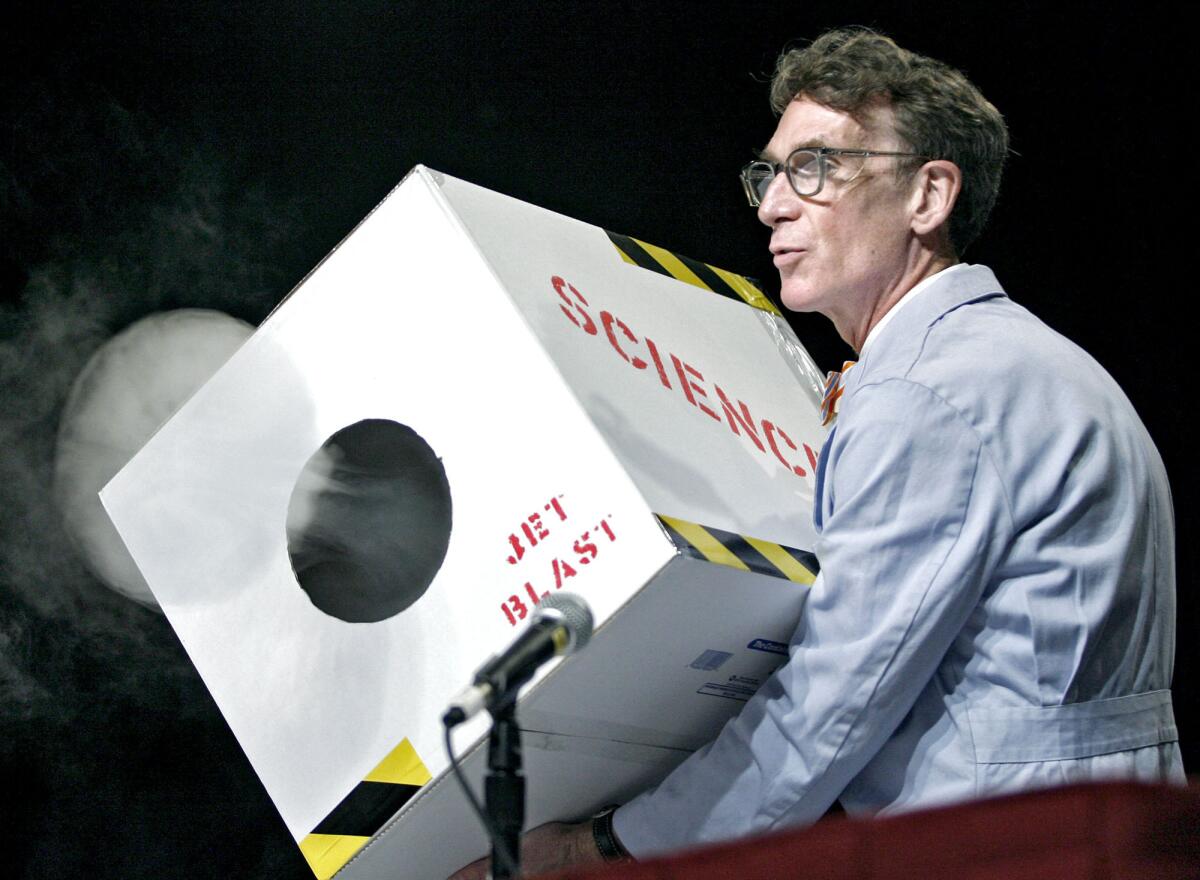In Theory: Nye thinks Noah’s Ark museum is all wet

In this file photo, Bill Nye “The Science Guy” sends out a blast of smoke from a box during a presentation at the Planetary Society’s PlanetFest at the Pasadena Convention Center on Saturday, Aug. 4, 2012.
Bill Nye, the bow-tied scientist who graced the small screen in the ‘90s children’s show “Bill Nye The Science Guy,” recently visited Williamstown, Ky., the site of the $100-million Noah’s Ark museum, a 510-foot-long replica ship.
The ark, built by a Christian ministry that believes the Biblical story of Noah as fact, was spearheaded by Ken Ham, a Christian fundamentalist who sparred with Nye in a widely viewed debate in 2014 (it’s believed that the debate spurred the funds to help Ham and the ministry build the ark — a belief the ministry has denied).
Remarking on the reaction of ark visitors, specifically children, Nye said the kids are being “brainwashed,” the Washington Post reports.
“This could be just a charming piece of Americana, just something — I recently used an app called Roadtrippers that takes you to odd or unusual places … but this is much more serious than that,” said Nye. “This guy promotes so very strongly that climate change is not a serious problem, that humans are not causing it, that some deity will see to it that everything is OK.”
Ham commented on Nye’s visit on Facebook, saying, “It was a clash of world views.”
Q: What do you think of Nye’s comments? What harm is there, if any, of an attraction like Ham’s ark replica and the beliefs it promotes?
A Biblical-themed amusement park with rides and attractions sounds like fun. Does it really matter that it rained and rained for 40 days, if I get to pet a llama? Does it not speak to the wonder of God’s creations to have an exhibit of unusual sea creatures or birds or reptiles or insects that are not native to the geographical location of the park? If I was to build such an amusement park, I would make sure have a section entitled, “Mysteries of the Bible.” I would then make great use of books such as Werner Keller’s “The Bible as History” to explain some “miracles and those not explainable,” I would have a subsection called “Unsolved mysteries of the Bible,” “or Faith,” or “To Be Known At a Later Date.”
The problem is still, secularists want to have things explained logically and “religionists” want everything explained “divinely.” The only thing divine in this world is the ability of people to explore and, God willing, discover things they did not know before. Truly, the importance of Moses’ 40-year journey through the desert was that it prepared the new generation for freedom in the land of Israel. The importance of a Biblical theme park is that it will make people freely think about scripture and its importance to us all. And if there are clashes of culture, so what? “When you get two theologians together …” You know the rest!
Rabbi Mark Sobel
Temple Beth Emet
Burbank
My concern with Nye’s campaign against creationism is that he perpetuates the idea that there is an inherent, and irreconcilable, conflict between science and religion.
Although the LDS church doesn’t take the strict creationist view embraced by museum founder Ken Ham and his supporters, we believe that the Earth was formed at God’s direction and that we were created in his image. We don’t profess to know exactly how this was accomplished.
This approach is reflected in a comment by former church President Gordon B. Hinckley. Asked about his views on evolution, he replied, “Studied all about. Didn’t worry me then. Doesn’t worry me now.”
His answer reflects the belief among most church members that science and religion can co-exist reasonably well, and have done so for many years. We have advanced from primitive flight to space travel, and from leeching to gene therapy, even as millions of parents have taught their children to believe in God and trust the Bible. I don’t think their faith is an impediment to scientific progress.
As I noted in an earlier response to a similar topic, science and religion have very different purposes. Scientists seek to explain the minute details of how our universe, and life within it, function. Science changes as new pieces of the puzzle are discovered. Religion deals with the creation only in the broad terms required to explain our eternal relationship with God.
Henry Eyring, an LDS scientist who won the National Science Medal for developing the Absolute Rate Theory of chemical reactions, believed the sometimes bitter controversies between science and religion were unnecessary. His view is shared many church members.
“Only as one’s understanding approaches the divine will all seeming contradictions disappear,” he wrote. “In the meantime, we can only continue our quest for the balanced view that comes from weighing all evidence carefully in the search for enduring values.”
Michael White
The Church of Jesus Christ of Latter-day Saints
La Crescenta
In a rational world as part of a good education children would receive a neutral introduction to the history, ideas and mythologies of the world’s major religious beliefs in their political and social context. This would not be proselytizing and would supplement, not replace, the family and community religious milieu.
There would be no confusing any religion with the scientific principles and facts that we know underlie and explain the universe.
I am grateful for Bill Nye speaking out as he has, futile though it seems. Ironically, all the publicity surrounding the Nye-Ham exchange garnered “Answers in Genesis,” Ken Ham’s organization, a lot of donations. Ham also received Kentucky state tax incentives worth up to $18 million, despite the religious nature of his project.
As Nye points out, picture the impossibility of, say, an Islamic project getting such support from the state of Kentucky. We have left rationality far behind here.
Roberta Medford
Atheist
Montrose